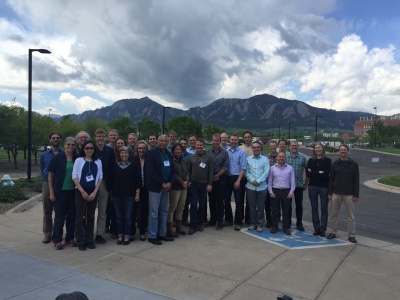CHESS
Computational Human and Earth Systems Science (CHESS)
Workshop: Linking Earth System Dynamics and Social System Modeling, May 23-25th, 2016, Boulder CO
Keynote presentations
Workshop Report
The Earth system is increasingly dominated by human action, and at the same time Earth system processes continue to significantly impact human life and well-being. This creates an urgent need for integrated human and Earth system models (HESMs) that are capable of capturing the dynamics of both biogeophysical and social systems models of human decisions and actions. Such integrated models will provide new insights into the multi-scale interactions among markets, atmospheric physics, energy consumption, terrestrial hydrology, water use, soil biochemistry, land use, and other societal and biophysical processes.
CSDMS is leading this ambitious integrated modeling effort, and hosted the first of several workshops on Computational Human and Earth System Science (CHESS) in Boulder on May 23-25th 2016. The workshop brought together a diverse group of multi-disciplinary researchers to develop a strong research plan and timetable for the integration of human systems models with Earth systems models. The workshop and a follow-up teleconference on August 5, 2016 initiated the process of assessing the intellectual, informatics, and material resources needed to develop models of human systems dynamics and couple them with models of Earth system dynamics.
The workshop consisted of 35 leading global representatives from computational social science and Earth system modeling communities, including researchers in collaboration with national and international laboratories that have an interest in the human dimensions of the Earth system. Participants recognized and discussed seven interdisciplinary research issues related to development of global-scale HESMs: the purpose of linking models; land, water and human dynamics; coupling of existing human and Earth system models; extreme events and migration; decisions, behaviors and institutional change; multi-scalar impact assessment methods, and model evaluation. Following in-depth discussions of each of these key issues, the group identified challenges facing the advancement of HESMs, and set a three-year time frame as a goal for executing a research plan to address these challenges.
To maintain the momentum created by the workshop, the CHESS community is actively producing a white paper and will maintain a wiki on the CSDMS website, and is further increasing visibility through a community-authored editorial paper, an EOS meeting report and a CHESS-themed AGU session. Additional funding and endorsement opportunities have been identified for supporting the growth of CHESS and linking to upcoming Community Earth Systems Model (CESM) meetings and a full second workshop to be held in May 2017.
The report of this meeting can be downloaded here.
This workshop was organized jointly by CSDMS and ComSES Net (Network for Computational Modeling in Social and Ecological Sciences), and was jointly funded by CSDMS, the National Science Foundation (NSF); and Future Earth's Analysis, Integration and Modeling the Earth System (AIMES) Project.
CoMSES Net: https://www.comses.net
NSF: http://www.nsf.gov/
AIMES: http://www.futureearth.org/projects/aimes-analysis-integration-and-modelling-earth-system

